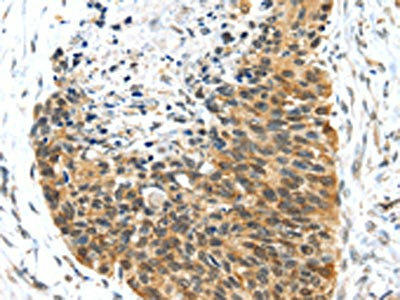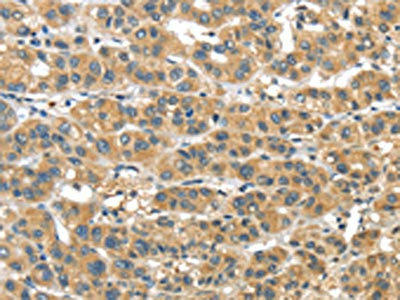Description
| Antibody Name: | PTMA Antibody (PACO17243) |
| Antibody SKU: | PACO17243 |
| Size: | 50ul |
| Host Species: | Rabbit |
| Tested Applications: | ELISA, IHC |
| Recommended Dilutions: | ELISA:1:2000-1:5000, IHC:1:25-1:100 |
| Species Reactivity: | Human, Mouse, Rat |
| Immunogen: | Full length fusion protein |
| Form: | Liquid |
| Storage Buffer: | -20°C, pH7.4 PBS, 0.05% NaN3, 40% Glycerol |
| Purification Method: | Antigen affinity purification |
| Clonality: | Polyclonal |
| Isotype: | IgG |
| Conjugate: | Non-conjugated |
 | The image on the left is immunohistochemistry of paraffin-embedded Human esophagus cancer tissue using PACO17243(PTMA Antibody) at dilution 1/30, on the right is treated with fusion protein. (Original magnification: x200). |
 | The image on the left is immunohistochemistry of paraffin-embedded Human liver cancer tissue using PACO17243(PTMA Antibody) at dilution 1/30, on the right is treated with fusion protein. (Original magnification: x200). |
| Background: | Prothymosin α (PTMA) is a nuclear protein possessing a number of cellular functions including cell survival. PTMA is identified to be localized in the nuclei of neurons, while it is found in both nuclei and cytoplasm in the astrocytes and microglia of adult brai. PTMA inhibits the neuronal necrosis induced by serum-free starvation or ischemia-reperfusion stress, which causes a rapid internalization of GLUT1/4, leading a decrease in glucose uptake and cellular ATP levels. Extensive research on PTMA showed that it is of clinical significance and potential medical use as they may serve as a molecular marker for cancer prognosis and/or as therapeutic agents for treating immunodeficiencies, autoimmune diseases and malignancies. |
| Synonyms: | prothymosin, alpha |
| UniProt Protein Function: | PTMA: Prothymosin alpha may mediate immune function by conferring resistance to certain opportunistic infections. Belongs to the pro/parathymosin family. 2 isoforms of the human protein are produced by alternative splicing. |
| UniProt Protein Details: | Protein type:Cell cycle regulation; Nuclear receptor co-regulator Chromosomal Location of Human Ortholog: 2q37.1 Cellular Component: cytoplasm; nucleoplasm; nucleus Molecular Function:protein binding Biological Process: transcription, DNA-dependent |
| UniProt Code: | P06454 |
| NCBI GenInfo Identifier: | 135834 |
| NCBI Gene ID: | 5757 |
| NCBI Accession: | P06454.2 |
| UniProt Secondary Accession: | P06454,Q15249, Q15592, |
| UniProt Related Accession: | P06454 |
| Molecular Weight: | 12,074 Da |
| NCBI Full Name: | Prothymosin alpha |
| NCBI Synonym Full Names: | prothymosin, alpha |
| NCBI Official Symbol: | PTMA |
| NCBI Official Synonym Symbols: | TMSA |
| NCBI Protein Information: | prothymosin alpha |
| UniProt Protein Name: | Prothymosin alpha |
| Protein Family: | Prothymosin |
| UniProt Gene Name: | PTMA |
| UniProt Entry Name: | PTMA_HUMAN |
| Antibodies | ELISA Kits |
| Anti-PTMA Antibody (CAB1956) | Human PTMA / Prothymosin alpha ELISA Kit |
| PTMA Antibody (PACO11581) | Human Prothymosin alpha (PTMA) ELISA Kit |
| Secondary Antibody |
| Anti-HRP Goat Anti-Rabbit IgG (H+L) Antibody (CABS014) |
| Recommended Products |
| Anti-FITC Goat Anti-Rabbit IgG (H+L) Antibody (CABS011) |
| Anti-HRP-conjugated Beta Actin Antibody (CABC028) |






